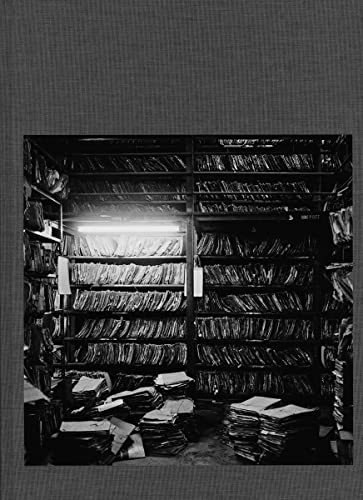Verwandte Artikel zu Dayanita Singh: File Room: File Room (E)

Inhaltsangabe
Dayanita Singh’s File Room is an elegy to paper in the age of the digitization of information and knowledge. The analogue photographer and bookmaker has a unique relationship with paper that is integral not only to the work of making of images, texts and memory, but also to a larger confrontation with chaos, mortality and disorder in the labyrinths of working bureaucratic archives in a country of more than a billion people. The endless rows of files in Indian courts, municipal offices, state archives and other such institutions for the conservation of human data create monuments to knowledge and to the arts of memory. They have their own atmosphere and architecture, rooted both in history and in the present. Archivists spend their lives organizing and conserving these forests of paper; historians and scholars forage in them for voices from the past; and the lives of ordinary men and women get entangled in the bureaucratic and litigious systems with their own copiousness of paperwork and files. Including an interview with Hans Ulrich Obrist that relates this book with Singh’s other books and bodies of work, and texts by Aveek Sen that explore the different ways in which the mad world of files and paperwork continue to touch ordinary lives, File Room is itself an archive of archives. It documents, and reflects on, the nature of paper as material and symbol in the work of making photographs and books. Dayanita Singh was born in New Delhi in 1961 and studied at the National Institute of Design in Ahmedabad and the International Center of Photography in New York. Singh has exhibited at institutions including the Serpentine Gallery in London and Hamburger Bahnhof in Berlin. Handcrafting books is central to her practice. Singh’s books at Steidl include Privacy (2004), Go Away Closer (2007), Sent a Letter (2008) and Dream Villa (2010).
Die Inhaltsangabe kann sich auf eine andere Ausgabe dieses Titels beziehen.
Von der hinteren Coverseite
Dayanita Singhs photos of archives and their custodians across India examine how memory is made and how history is narrated. These images bring to light the paradox of archives: they are impersonal in their classifications, yet each is the careful handiwork of an individual archivist, an unsung keeper of history whose decisions generate the sources of much of our knowledge. Archives are vessels of orthodox fact but can also be the home of neglected details and forgotten documents than can unfix the status quo. As the pace of change in contemporary India accelerates and Indians turn from the past and fix their gaze on the future, what will become of the archive? Singh prompts us to imagine archives as not merely documents of dusty scholarship but as monuments of knowledge, beautiful in their unkempt order. Dayanita Singh was born in New Delhi in 1961 and studied at the National Institute of Design in Ahmedabad and the International Center of Photography in New York. Singh has exhibited at institutions including the Serpentine Gallery in London and Hamburger Bahnhof in Berlin. Handcrafting books is central to her practice. Singhs books at Steidl include Privacy (2004), Go Away Closer (2007), Sent a Letter (2008) and Dream Villa (2010).
„Über diesen Titel“ kann sich auf eine andere Ausgabe dieses Titels beziehen.
EUR 4,00 für den Versand innerhalb von/der Deutschland
Versandziele, Kosten & DauerSuchergebnisse für Dayanita Singh: File Room: File Room (E)
File Room Dayanita Singh. Interview: Hans Ulrich Obrist. Texts: Aveek Sen
Anbieter: diakonia secondhand, München, Deutschland
Zustand: Sehr gut. 1. 88 S. Hardcover Zustand das Buches ist sehr gut. Kaum gelesen ohne Eintragungen, Knicken oder ähnliches. 1041 Sprache: Englisch Gewicht in Gramm: 910 Gebundene Ausgabe, Maße: 24.89 cm x 1.78 cm x 33.78 cm. Artikel-Nr. 43936
Anzahl: 1 verfügbar
Dayanita Singh: File Room: File Room (English)
Anbieter: castlebooksbcn, Barcelona, B, Spanien
Encuadernación de tapa dura. Zustand: Como Nuevo. Sin Sobrecubierta. Dayanita Singh s photos of archives and their custodians across India examine how memory is made and how history is narrated. These images bring to light the paradox of archives: they are impersonal in their classifications, yet each is the careful handiwork of an individual archivist, an unsung keeper of history whose decisions generate the sources of much of our knowledge. Archives are vessels of orthodox fact but can also be the home of neglected details and forgotten documents than can unfix the status quo. As the pace of change in contemporary India accelerates and Indians turn from the past and fix their gaze on the future, what will become of the archive? Singh prompts us to imagine archives as not merely documents of dusty scholarship but as monuments of knowledge, beautiful in their unkempt order. Artikel-Nr. ABE-1710583002583
Anzahl: 1 verfügbar
Dayanita Singh: File Room
Anbieter: Jackson Street Booksellers, Omaha, NE, USA
Hardcover. Zustand: Fine. No Jacket. 1st Edition. Fine in Folio in blue cloth with back titles. 1st Printing. Artikel-Nr. 157542
Anzahl: 1 verfügbar

